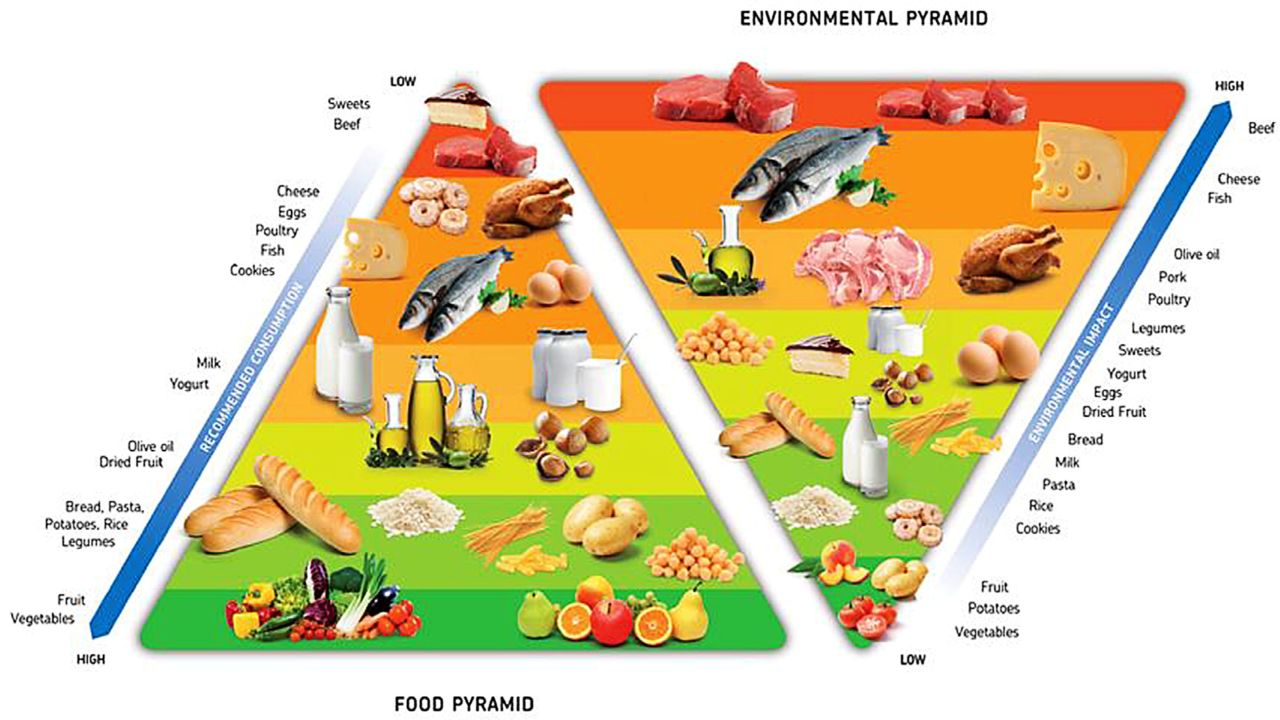Proper nutrition is essential for the health and well-being of our furry friends. Like humans, dogs require a balanced diet with the nutrients necessary to thrive. To help pet owners understand the principles of canine nutrition, there is a concept known as the “dog nutrition pyramid.” In this article, we will explore the significance of the dog nutrition pyramid and its role in ensuring the optimal health of our beloved pets.
What is the Dog Nutrition Pyramid?
The dog nutrition pyramid visually represents the essential food groups and nutrients that should be incorporated into a dog’s diet. It guides pet owners to decide what to feed their canine companions. The pyramid outlines the proportions and types of food that can provide a complete and balanced diet for dogs.
The Food Groups in the Dog Nutrition Pyramid
Proteins: Proteins are life’s building blocks for humans and dogs. They are crucial for the growth, repair, and maintenance of tissues, organs, and muscles. High-quality protein sources for dogs include lean meats like chicken, turkey, beef, and fish. Protein-rich foods also include eggs, cottage cheese, and yoghurt. Providing dogs with sufficient protein is important to support their overall health and vitality.
Carbohydrates: For dogs, carbohydrates are a vital source of energy. They support healthy brain function and supply energy for physical activity. Dogs can get plenty of carbs from whole grains like quinoa, brown rice, and oats. To give them vital vitamins, minerals, and dietary fibre, you can also include fruits and vegetables like blueberries, sweet potatoes, and carrots in their diet.
Fats and Oils: Dogs require fats and oils as a concentrated energy source and maintain healthy skin and coats. Omega-3 and omega-6 fatty acids are especially significant because of their capacity to reduce inflammation and support heart health. Dogs can obtain healthy fats from fish, flaxseed, and coconut oils. To avoid gaining weight and related health issues, it’s crucial to moderate the amount of fat in a dog’s diet.
Vitamins and Minerals: Vitamins and minerals support various bodily functions and maintain overall health. They are necessary for strong bones, a robust immune system, and proper organ function. It is important to provide dogs with a balanced mix of vitamins and minerals through their diet. Some common sources include vegetables, fruits, and supplements specifically formulated for dogs.
Water: Water is often overlooked but is an essential component of a dog’s diet. It is vital for digestion, nutrient absorption, temperature regulation, and overall hydration. Always ensure your dog has access to fresh and clean water throughout the day.
The Benefits of Following the Dog Nutrition Pyramid
By following the principles of the dog nutrition pyramid, you can provide your pet with a well-rounded diet that meets their specific nutritional needs. Here are some benefits of following the dog nutrition pyramid:
-
- Optimal Health: A balanced diet promotes overall health and helps prevent chronic diseases such as obesity, diabetes, and heart conditions.
- Healthy Weight Management: Feeding your dog a balanced diet can help them maintain a healthy weight, reducing the risk of joint problems and other weight-related issues.
- Improved Digestion: Providing a diet rich in fibre and nutrients supports healthy digestion and prevents gastrointestinal problems.
- Strong Immune System: A well-nourished dog is less likely to fall ill, as proper nutrition is crucial in strengthening their immune system.
- Shiny Coat and Healthy Skin: A balanced diet rich in omega-3 fatty acids and other essential nutrients promotes a healthy coat and skin, reducing the risk of dryness, itching, and allergies.
- Increased Energy and Vitality: By providing your dog with the right balance of nutrients, you can enhance their overall energy levels and vitality.
Implementing the Dog Nutrition Pyramid
To implement the dog nutrition pyramid effectively, it is important to consider the following:
-
- Consult Your Veterinarian: Every dog is unique, and their nutritional needs may vary based on age, breed, size, and activity level. Consulting with a veterinarian will help you determine your furry friend’s most suitable diet plan.
- Balance and Variety: Aim to provide a variety of foods within each food group to ensure a diverse range of nutrients. This will help prevent nutrient deficiencies and keep mealtimes interesting for your dog.
- Portion Control: It is crucial to feed your dog appropriate portions based on size, age, and activity level. Overfeeding can result in health problems such as weight gain.
- Avoiding Harmful Foods: Some human foods can be toxic and even fatal to dogs. It is important to be aware of foods harmful to dogs, such as chocolate, grapes, onions, garlic, and certain artificial sweeteners. Consult with your veterinarian to ensure you are feeding your dog safe and appropriate foods.
- Monitor and Adjust: Regularly monitor your dog’s weight, energy levels, and overall health. If you notice any changes, consult your veterinarian to determine if your diet needs adjustment.
- Transitioning to New Foods: When introducing new foods to your dog’s diet, it is best to do so gradually. Digestive distress may result from abrupt dietary changes. Mix the new food gradually with their existing diet. Increasing the amount until the transition is complete.
- Treats and Rewards: Treats can be a part of a balanced diet, but they should be given in moderation. Look for healthy treat options that align with the principles of the dog nutrition pyramid, or consider using small portions of their regular food as rewards instead.
Essential Vitamins and Minerals for Dogs

Below are examples of whole foods and herbs rich in your dog’s essential vitamins. Whether you are feeding air-dried, dehydrated, raw, or homecooked, consider including some of these ingredients in your dog’s food pyramid:
Essential Vitamins for Dogs
Vitamin Name
Function
Sources
Vitamin A
Supports vision, teeth and bones, skin, and reproduction
Beef, Fish, Egg, Liver, Carrots, Sweet Potatoes, Pumpkin, Spinach
Vitamin D
Supports healthy bones
Salmon, Egg, Beef, Beef Liver
Vitamin E
Protects cells from damage and supports heart health
Liver, Spinach, Sunflower Seeds
Thiamine
Supports carbohydrate metabolism and the nervous system
Poultry, Egg, Liver, Oats, Brewer’s Yeast
Riboflavin
Aids in energy
Muscle Meat, Egg, Liver, Green Vegetables
Pantothenic Acid
Assists with maintaining a healthy metabolism
Chicken, Egg, Liver, Broccoli
Niacin
Maintains healthy energy and hormone production, supports metabolism, nervous system, and cognitive function
Poultry, Fish, Liver
Pyridoxine
Helps support a healthy metabolism
Poultry, Kidney
Folic Acid
Aids in producing methionine, an essential amino acid that supports healthy red blood cells.
Liver, Kidney, Brewer’s Yeast, Green Vegetables
Vitamin B12
Supports a healthy metabolism and nervous system
Salmon, Egg, Liver, Kidney
Choline
Contributes to healthy liver, nerve, and muscle function
Krill, Egg, Heart, Liver
Below are examples of whole foods and herbs rich in your dog’s essential minerals. Whether you are feeding air-dried, dehydrated, raw or homecooked, consider including some of these ingredients in your dog’s food pyramid:
Essential Minerals for Dogs
Mineral Name
Function
Sources
Calcium
Main mineral in healthy teeth and bones and supports normal muscle function.
Salmon, Spinach, Rosemary
Phosphorus
Maintains healthy bones, teeth, and metabolism and helps stimulate kidney function
Chicken Liver, Oats, Brewer’s Yeast, Chervil (French Parsley)
Potassium
Supports nerve and muscle function
Chicken, Salmon, Dill
Sodium
Maintains healthy nerve and muscle cell function
Naturally occurring at various levels in meat, fruits, and vegetables
Chloride
Supports the metabolism and maintains healthy acid balance
Naturally occurring in many vegetables and seaweeds, like kelp
Magnesium
Essential mineral for healthy nerve, muscle, and heart function, supports immune health and regulates glucose.
Oats, Spinach, Broccoli, Seeds
Iron
Maintains and supplies oxygen in the circulatory system
Beef, Poultry, Egg, Apples, Green Vegetables, Thyme
Copper
Aids in iron absorption and the production of bones, collagen, and tissues
Beef Liver, Oats, Quinoa, Spirulina, Thyme, Basil
Manganese
Supports the metabolism, healthy bones, and cartilage and energy production
Eggs, Oats, Quinoa, Green Vegetables, Thyme, Basil
Zinc
Promotes healthy immune and brain function, growth of skin and coat, and collagen and hormone production
Oysters, Beef Liver, Chicken Heart, Parsley
Iodine
Assists with hormone production in the thyroid, which contributes to a healthy metabolism
Kelp
Selenium
Protects cells from damage and supports healthy metabolism and thyroid
Turkey, Salmon, Beef Liver
Building Your Dog’s Pyramid for Holistic Health
Choose minimally processed, high-quality foods such as Dr. Bob Goldstein’s Wisdom® Dog Food when building your dog’s pyramid. Wisdom is veterinarian-formulated to optimize a dog’s health. It is crafted using a one-of-a-kind air drying process that locks in flavour and preserves the nutrients in its whole-food ingredients like humanely raised proteins, sprouted seeds, fruits, and vegetables.
Conclusion
The dog nutrition pyramid and implementing its principles can significantly contribute to your canine companion’s overall health and well-being. A balanced diet that includes proteins, carbohydrates, fats, vitamins, minerals, and water ensures that your dog receives the essential nutrients needed to thrive.
FAQ
What is a Healthy Food Pyramid for Dogs?
We have created our Healthy Food Pyramid for Dogs to optimize your pup’s health. We hope these building blocks guide you to a balanced diet made with whole foods that provide the nutrients your dog needs to thrive, helping to prevent the many chronic illnesses stemming from poor nutrition that affect millions of pets today.
What are the 6 Basic Nutrients a Dog Needs?
The six basic nutrients are water, proteins, fats, carbs, minerals, and vitamins. The body’s fundamental processes depend on these vital nutrients, which must be included in the dog’s diet. For many nutrients, the minimal dietary requirement has been determined.
What is a Food Pyramid?
The food pyramid is a concept that helps humans understand the breakdown of what we need from our daily diet to live a balanced life. The ratios of carbohydrates, proteins, dairy, fruit and vegetables (and the naughty stuff) are all arranged to showcase the optimal way to get the most nutrients from our diet.

